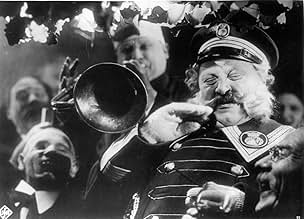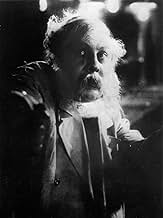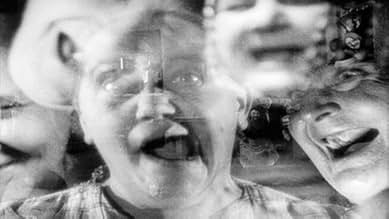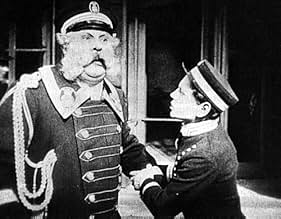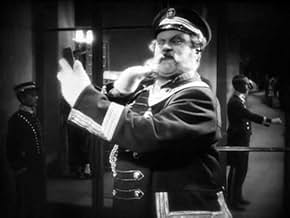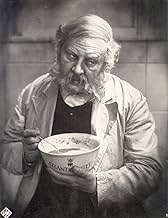NOTE IMDb
8,0/10
16 k
MA NOTE
En 1924, à Berlin. Le portier d'un grand hôtel, fier de l'uniforme qu'il porte depuis des années, est renvoyé de son poste pour cause de vieillesse, et relégué au rang de garçon de lavabos, ... Tout lireEn 1924, à Berlin. Le portier d'un grand hôtel, fier de l'uniforme qu'il porte depuis des années, est renvoyé de son poste pour cause de vieillesse, et relégué au rang de garçon de lavabos, ce qui est, pour lui, une déchéance sociale.En 1924, à Berlin. Le portier d'un grand hôtel, fier de l'uniforme qu'il porte depuis des années, est renvoyé de son poste pour cause de vieillesse, et relégué au rang de garçon de lavabos, ce qui est, pour lui, une déchéance sociale.
- Réalisation
- Scénario
- Casting principal
- Récompenses
- 2 victoires au total
O.E. Hasse
- Small Role
- (non crédité)
Harald Madsen
- Wedding Musician
- (non crédité)
Neumann-Schüler
- Small Role
- (non crédité)
Carl Schenstrøm
- Wedding Musician
- (non crédité)
Erich Schönfelder
- Small role
- (non crédité)
Avis à la une
Although the Golden Twenties of German cinema, a golden age corresponding approximately to the era from the making of The Cabinet of Dr. Caligari in 1919 to Hitler's absorption of the German film industry for the purposes of the Nazi regime, has come to be widely associated in public consciousness with the grotesque, the mystical and the fantastic of German Expressionism, indeed with such iconic figures to spearhead it as Nosferatu, the Somnabulist, Dr. Caligari, Mephisto and the Golem, all of them having their roots in the folklore or a fantastic reimagined past, there was also a more realistic, if no less tragic, depiction of a middle-class present with a focus on a psychological, as opposed to metaphysical, aspect.
By 1924 the acceptance of the Dawes Plan by Germany had lulled the German Republic into a sense of economic stability that was to last until the stock market crash in 1929. It was that same stability that most hurt the German film industry, as the Dawes Plan imposed the reduction of all exports, leaving many independent production companies without foreign markets for their product. In the years to come Hollywood would seize this unique financial opportunity to break down its only European rival, but before major box-office flops like Fritz Lang's epic rendition of Die Nibelungen (1924) and Metropolis (1927) and FW Murnau's Faust (1926) would bring UFA to its proverbial knees in debt to German banks, little films like The Last Laugh (1924) and Varieté (1925) were the toast of the town in both sides of the Atlantic.
Emil Jannings plays an aging hotel porter who takes great pride and pleasure in his job and especially the lavish uniform that comes with it. In the miserable middle-class neighborhood he lives, being able to wake up in the morning and go to work dressed like in such a prestigious uniform is like being a general. That is until a younger man is hired in his place and he's demoted to the, undignified in his mind, job of lavatory attendant. Not bearing to lose face back home with gossiping neighbors and relatives, the old porter steals back his uniform and returns home as if nothing happened, the uniform a symbol not only of his social status but also of purpose in life.
What is most striking about The Last Laugh is the way Murnau externalizes the psychological in a grand, theatric way that could only work on stage and in silent cinema. Watch for example the look of pure anguish and horror in Janning's face when he's asked to turn in his uniform, stripping it off like he's being skinned alive. Recoiling without it into a state of defeat and abandonment like a man stripped of his own identity, with nothing to live for.
Obsessed with artistic control and exercising complete authority over the minutest details of lighting and décor, German directors pushed for an increasingly studio-bound cinema to the point that UFA in the years between 1919 and 1927 became the best equipped movie studio in the western world. The Last Laugh is no exception. The facades of apartment blocks in the background with light slanting over them, the low-class neighborhood, the busy street in front of the hotel, all of them replicated in great detail within studio limits. It's within this geography that Murnau transposes Jannings' internal world. As is proper for the inward journey of the self the protagonist faces, the aging porter starts at the busy front of the hotel only to find himself exiled in the dark bowels of the basement where he remains hidden, that is until the film's tacked-on happy ending.
The only false note in an otherwise perfect film is the happy ending Murnau and scriptwriter Carl Mayer (of Caligari fame) were forced to devise by UFA executives anxious for the box office success of their movie. It's not that it doesn't work because such a tragic tale precludes a happy ending, after all one of the most memorable endings in all cinema is that of Capra's It's a Wonderful Life and it doesn't get any more saccharine than that, but because it happens in such a tacked-on deus-ex-machina fashion that it feels like a complete cop-out. It's lame now and it was lame then and Murnau no doubt understood that as he flashes a title card (the only title card in the film) more or less apologizing that "that's how the movie would've ended if I didn't have a boss to keep happy so here's a they-lived-happily-ever-after epilogue, take it with a pinch of salt or ignore it altogether". It's noteworthy however that it's not pure schmaltzy tripe. It feels as though Murnau is taking a perverse, vulgar pleasure in delivering what was asked of him.
Exceptionally photographed, with a modern feel to Murnau's camera-work that places it well ahead of its time compared to other silents, a great example of purely visual storytelling without the cumbersome crutches of the title cards, The Last Laugh stands not only as a triumph of Weimar cinema but as masterpiece almost 100 years later.
By 1924 the acceptance of the Dawes Plan by Germany had lulled the German Republic into a sense of economic stability that was to last until the stock market crash in 1929. It was that same stability that most hurt the German film industry, as the Dawes Plan imposed the reduction of all exports, leaving many independent production companies without foreign markets for their product. In the years to come Hollywood would seize this unique financial opportunity to break down its only European rival, but before major box-office flops like Fritz Lang's epic rendition of Die Nibelungen (1924) and Metropolis (1927) and FW Murnau's Faust (1926) would bring UFA to its proverbial knees in debt to German banks, little films like The Last Laugh (1924) and Varieté (1925) were the toast of the town in both sides of the Atlantic.
Emil Jannings plays an aging hotel porter who takes great pride and pleasure in his job and especially the lavish uniform that comes with it. In the miserable middle-class neighborhood he lives, being able to wake up in the morning and go to work dressed like in such a prestigious uniform is like being a general. That is until a younger man is hired in his place and he's demoted to the, undignified in his mind, job of lavatory attendant. Not bearing to lose face back home with gossiping neighbors and relatives, the old porter steals back his uniform and returns home as if nothing happened, the uniform a symbol not only of his social status but also of purpose in life.
What is most striking about The Last Laugh is the way Murnau externalizes the psychological in a grand, theatric way that could only work on stage and in silent cinema. Watch for example the look of pure anguish and horror in Janning's face when he's asked to turn in his uniform, stripping it off like he's being skinned alive. Recoiling without it into a state of defeat and abandonment like a man stripped of his own identity, with nothing to live for.
Obsessed with artistic control and exercising complete authority over the minutest details of lighting and décor, German directors pushed for an increasingly studio-bound cinema to the point that UFA in the years between 1919 and 1927 became the best equipped movie studio in the western world. The Last Laugh is no exception. The facades of apartment blocks in the background with light slanting over them, the low-class neighborhood, the busy street in front of the hotel, all of them replicated in great detail within studio limits. It's within this geography that Murnau transposes Jannings' internal world. As is proper for the inward journey of the self the protagonist faces, the aging porter starts at the busy front of the hotel only to find himself exiled in the dark bowels of the basement where he remains hidden, that is until the film's tacked-on happy ending.
The only false note in an otherwise perfect film is the happy ending Murnau and scriptwriter Carl Mayer (of Caligari fame) were forced to devise by UFA executives anxious for the box office success of their movie. It's not that it doesn't work because such a tragic tale precludes a happy ending, after all one of the most memorable endings in all cinema is that of Capra's It's a Wonderful Life and it doesn't get any more saccharine than that, but because it happens in such a tacked-on deus-ex-machina fashion that it feels like a complete cop-out. It's lame now and it was lame then and Murnau no doubt understood that as he flashes a title card (the only title card in the film) more or less apologizing that "that's how the movie would've ended if I didn't have a boss to keep happy so here's a they-lived-happily-ever-after epilogue, take it with a pinch of salt or ignore it altogether". It's noteworthy however that it's not pure schmaltzy tripe. It feels as though Murnau is taking a perverse, vulgar pleasure in delivering what was asked of him.
Exceptionally photographed, with a modern feel to Murnau's camera-work that places it well ahead of its time compared to other silents, a great example of purely visual storytelling without the cumbersome crutches of the title cards, The Last Laugh stands not only as a triumph of Weimar cinema but as masterpiece almost 100 years later.
I just viewed this film on the pristine Kino video release, having seen a poorish print years ago.
One of the great classics of the German silent cinema, hugely influential, this true work of art not only displays the seemingly limitless resources of the UFA studios, but dares to break constantly with convention, particularly by being a "pure" film and dispensing with intertitles, but most spectacularly in its use of the "subjective" camera--creating as far as I know, the first sustained use of "point of view" in the history of movies, which had hitherto shown us action objectively, as it were: the spectator had always merely "observed," as in a third person narrative. Even Griffith and Bitzer's trucking shots, while including "us" in the action, did not represent another character's point of view. Well, after "the Last Laugh," P.O.V. turns up again and again. (See Abel Gance's "Napoleon.") Today the technique is common (necessary!). The most famous shots in "Der Letzte Mann" include the drunken swaying of the room seen through the Doorman's bleary eyes (cinematographer Karl Freund seated in a large swing and pushed back and forth); the opening shot coming down into the lobby by elevator and exiting the gate; and the astonishing vision of the hotel toppling in slow motion over on the poor doorman after his demotion. And can you believe that first night cityscape with the driving rain was all constructed and shot INDOORS?
However, I must say there is an unfortunate message in this drama, that of the merciless German stereotype: fawning before authority and deriding weakness--humiliating the powerless, admiring, almost worshiping the powerful. This is shown by the doorman's vanity and puffed-up self-image, which hinges, it seems, on a splendid uniform and the deference it alone inspires. Position is everything to him, his family, employers, hotel guests and neighbors. This is a shallow world, indeed, a social mentality that I can imagine, without straining too much, easily leading in a few brief years straight to the all-too-successful Gestapo! (I would add that the ending seems to contradict this, but the ending must be discounted; it is a sheer fantasy, "tacked on," really unrelated to the rest of the film and completely out of character.)
One of the great classics of the German silent cinema, hugely influential, this true work of art not only displays the seemingly limitless resources of the UFA studios, but dares to break constantly with convention, particularly by being a "pure" film and dispensing with intertitles, but most spectacularly in its use of the "subjective" camera--creating as far as I know, the first sustained use of "point of view" in the history of movies, which had hitherto shown us action objectively, as it were: the spectator had always merely "observed," as in a third person narrative. Even Griffith and Bitzer's trucking shots, while including "us" in the action, did not represent another character's point of view. Well, after "the Last Laugh," P.O.V. turns up again and again. (See Abel Gance's "Napoleon.") Today the technique is common (necessary!). The most famous shots in "Der Letzte Mann" include the drunken swaying of the room seen through the Doorman's bleary eyes (cinematographer Karl Freund seated in a large swing and pushed back and forth); the opening shot coming down into the lobby by elevator and exiting the gate; and the astonishing vision of the hotel toppling in slow motion over on the poor doorman after his demotion. And can you believe that first night cityscape with the driving rain was all constructed and shot INDOORS?
However, I must say there is an unfortunate message in this drama, that of the merciless German stereotype: fawning before authority and deriding weakness--humiliating the powerless, admiring, almost worshiping the powerful. This is shown by the doorman's vanity and puffed-up self-image, which hinges, it seems, on a splendid uniform and the deference it alone inspires. Position is everything to him, his family, employers, hotel guests and neighbors. This is a shallow world, indeed, a social mentality that I can imagine, without straining too much, easily leading in a few brief years straight to the all-too-successful Gestapo! (I would add that the ending seems to contradict this, but the ending must be discounted; it is a sheer fantasy, "tacked on," really unrelated to the rest of the film and completely out of character.)
Warning - Possible spoilers lie within.
This is the first silent movie I have watched in its entirety, having previously found myself becoming restless and distracted, I normally find them quite difficult to watch. I came across the Criterion edition of the movie in a large collection of Laserdiscs that I purchased recently, and decided to give it a try. I was speechless.
'The Last Laugh' (or 'The Last Man', as its translation would lead you to believe, is a touching story from director F.W. Murnau about an un-named Hotel Porter & Doorman (played excellently by Emil Jannings) who, through no fault of his own, is demoted to Lavatory attendant, and we hereby watch as his life collapses around him. It's an incredibly emotional story - during his downfall, as his friends and family mock him, Jannings' depressed, hunched-over figure can be painfully sad to watch. I found myself filling up in the scene when he finally hands his beloved porter's uniform over to the night watchman.
A landmark in the era of silent films, Murnau used some very clever camera tricks (such as smearing vaseline on the camera lens for 'dream' sequences). It was also one of the first films to use a completely free moving camera with no tripod, testimony to the success of this can be seen immediately in the first scene as the film starts. There are also no title cards in the film. Nor are they needed - The story is carried perfectly by the actors and on no occasion do you feel that you don't know what is going on.
I won't give anything away here, but there are some people that may feel the ending is a little out of place - However, I had grown so fond on Jannings' character that in a way, I was relieved to see the film move on from the final scene where he is sat hunched on the seat in the washroom - and for him to finally have 'The Last Laugh' so to speak :o)
If you have any interest in old cinema, and have not seen this, or just fancy a change from all of the samey Hollywood flicks being churned out right now, I suggest you hunt out a copy right away. Highly recommended.
This is the first silent movie I have watched in its entirety, having previously found myself becoming restless and distracted, I normally find them quite difficult to watch. I came across the Criterion edition of the movie in a large collection of Laserdiscs that I purchased recently, and decided to give it a try. I was speechless.
'The Last Laugh' (or 'The Last Man', as its translation would lead you to believe, is a touching story from director F.W. Murnau about an un-named Hotel Porter & Doorman (played excellently by Emil Jannings) who, through no fault of his own, is demoted to Lavatory attendant, and we hereby watch as his life collapses around him. It's an incredibly emotional story - during his downfall, as his friends and family mock him, Jannings' depressed, hunched-over figure can be painfully sad to watch. I found myself filling up in the scene when he finally hands his beloved porter's uniform over to the night watchman.
A landmark in the era of silent films, Murnau used some very clever camera tricks (such as smearing vaseline on the camera lens for 'dream' sequences). It was also one of the first films to use a completely free moving camera with no tripod, testimony to the success of this can be seen immediately in the first scene as the film starts. There are also no title cards in the film. Nor are they needed - The story is carried perfectly by the actors and on no occasion do you feel that you don't know what is going on.
I won't give anything away here, but there are some people that may feel the ending is a little out of place - However, I had grown so fond on Jannings' character that in a way, I was relieved to see the film move on from the final scene where he is sat hunched on the seat in the washroom - and for him to finally have 'The Last Laugh' so to speak :o)
If you have any interest in old cinema, and have not seen this, or just fancy a change from all of the samey Hollywood flicks being churned out right now, I suggest you hunt out a copy right away. Highly recommended.
In 1920s Germany, a hotel doorman takes great pride in both his job and the grand uniform that denotes his position. The uniform earns him the unquestioning respect of his neighbours, so when he is demoted through no fault of his own to the lowly position of lavatory attendant, the doorman is devastated. Stealing the uniform that once was his, he makes a sad attempt to fool his neighbours into thinking he still manages the door of the prestigious Atlantic Hotel but, before long, the truth is uncovered, and the respect they once paid him quickly dissolves.
The Last Laugh stands as one of the finest creations of a remarkable director, F.W. Murnau, whose credits include Nosferatu, Faust and Sunrise. Filmed without use of subtitles – and to appreciate what an astounding achievement this is, try imagining a dramatic film made without any form of dialogue today – Murnau crafts a beautiful, compelling and tragic tale that stands as both testimony to his undoubted skills and to the artistic heights to which silent cinema often aspired.
The venerated German actor Emil Jannings was only 40 when he took on the role of the unnamed porter, and yet a combination of Waldemar Jabs painstaking make-up and Jannings' own ability to convey his character's heartache in simple ways, such as the stoop of his shoulders or a bent leg, means he gives a towering performance that never threatens, however, to overshadow the story being told.
The story revolves as much around the grandiose uniform Jannings wears as it does the man. A symbol of the contemporary German importance attached to uniforms and their unavoidably militaristic connotations, the uniform is portrayed as making the man – and it is only the contentious ending that spins the message that it is not uniforms but compassion and kindness that make men great – not only through the respect he receives from all around him, but in the transformation the porter undergoes whenever he is parted from it. From a ramrod-backed creature of magnificence, with elaborately arranged hair and whiskers, he turns into a fumbling old man with bowed back and shaking hands. In the hands of a lesser actor, the demands of this transformation may have descended into cheap caricature, but Jannings never lets us lose sight of the proud man lurking within the bowed and beaten body.
Karl Freund's camera-work is a revelation in this film, right from the opening shot as we descend with the lift into the foyer of the opulent Atlantic hotel. Numerous tricks are used without drawing attention to their use and thus distracting the viewer from the tragedy that is taking place: the drunken POV shot (achieved by strapping the camera to Freund's chest) in Jannings' flat after his niece's wedding reception; the blurred fantasy sequences (themselves a breakthrough in film narrative) achieved by smearing Vaseline onto the camera lens, and the use of dialectic montage and dolly shots, were all groundbreaking techniques never before used, but copied forevermore.
Murnau directs the film with the assurance of a man at the top of his form – where he would arguably remain until his tragically early death – and the care taken with this film is evident throughout every shot. This is why Murnau made relatively few films in an era when many directors churned them out at a rate of a dozen or more per year. The degree of a director's conscientiousness is always evident on the screen, and it is always a pleasure to view a Murnau film, because it is clear that his commitment to his work was always second to none.
The Last Laugh stands as one of the finest creations of a remarkable director, F.W. Murnau, whose credits include Nosferatu, Faust and Sunrise. Filmed without use of subtitles – and to appreciate what an astounding achievement this is, try imagining a dramatic film made without any form of dialogue today – Murnau crafts a beautiful, compelling and tragic tale that stands as both testimony to his undoubted skills and to the artistic heights to which silent cinema often aspired.
The venerated German actor Emil Jannings was only 40 when he took on the role of the unnamed porter, and yet a combination of Waldemar Jabs painstaking make-up and Jannings' own ability to convey his character's heartache in simple ways, such as the stoop of his shoulders or a bent leg, means he gives a towering performance that never threatens, however, to overshadow the story being told.
The story revolves as much around the grandiose uniform Jannings wears as it does the man. A symbol of the contemporary German importance attached to uniforms and their unavoidably militaristic connotations, the uniform is portrayed as making the man – and it is only the contentious ending that spins the message that it is not uniforms but compassion and kindness that make men great – not only through the respect he receives from all around him, but in the transformation the porter undergoes whenever he is parted from it. From a ramrod-backed creature of magnificence, with elaborately arranged hair and whiskers, he turns into a fumbling old man with bowed back and shaking hands. In the hands of a lesser actor, the demands of this transformation may have descended into cheap caricature, but Jannings never lets us lose sight of the proud man lurking within the bowed and beaten body.
Karl Freund's camera-work is a revelation in this film, right from the opening shot as we descend with the lift into the foyer of the opulent Atlantic hotel. Numerous tricks are used without drawing attention to their use and thus distracting the viewer from the tragedy that is taking place: the drunken POV shot (achieved by strapping the camera to Freund's chest) in Jannings' flat after his niece's wedding reception; the blurred fantasy sequences (themselves a breakthrough in film narrative) achieved by smearing Vaseline onto the camera lens, and the use of dialectic montage and dolly shots, were all groundbreaking techniques never before used, but copied forevermore.
Murnau directs the film with the assurance of a man at the top of his form – where he would arguably remain until his tragically early death – and the care taken with this film is evident throughout every shot. This is why Murnau made relatively few films in an era when many directors churned them out at a rate of a dozen or more per year. The degree of a director's conscientiousness is always evident on the screen, and it is always a pleasure to view a Murnau film, because it is clear that his commitment to his work was always second to none.
This classic is distinctive in several respects. The expressionistic style and creative camera work, along with a noteworthy leading performance by Emil Jannings, turn a simple story into a thought-provoking experience. It is also very interesting for its almost complete lack of title cards, demonstrating how a skilled practitioner of the art of silent cinema can convey all kinds of attitudes and emotions without employing dialogue of any kind.
The actual story is very simple. Jannings portrays a doorman at a fine hotel, who takes enormous pride in his position, his work, and especially his uniform. One day the hotel manager passes by, misunderstands what he sees, and decides that the doorman is too old for the job. The next day, a new doorman takes his place, and he is relegated to working in the washroom. The rest of the film then shows the effect of this change on the doorman and on the way that others view him and treat him. The plot developments themselves are conveyed efficiently and succinctly, so that the emphasis is on the feelings and perceptions of the characters. The acting, camera work, and settings are all used very carefully to emphasize the changes that take place inside Jannings' character and in the attitudes of others towards him as a result of his demotion.
These changes are often very (deliberately) exaggerated, and there are times when they honestly strain credibility a bit too much. And it is not always easy to watch the doorman's anguish, but it gives you plenty to think about - part of his suffering comes from the foolish attitudes of others, but much of it also comes from his own over-dependence on his position for his happiness. It is remarkable how much is expressed without even using title cards - there is just one in the entire movie, a note that introduces the last part of the film, when further developments occur that introduce a new set of themes.
"The Last Laugh" is worth seeing for anyone who likes silent films, for its thought-provoking story and perhaps even more so for its creative and masterful use of silent film techniques.
The actual story is very simple. Jannings portrays a doorman at a fine hotel, who takes enormous pride in his position, his work, and especially his uniform. One day the hotel manager passes by, misunderstands what he sees, and decides that the doorman is too old for the job. The next day, a new doorman takes his place, and he is relegated to working in the washroom. The rest of the film then shows the effect of this change on the doorman and on the way that others view him and treat him. The plot developments themselves are conveyed efficiently and succinctly, so that the emphasis is on the feelings and perceptions of the characters. The acting, camera work, and settings are all used very carefully to emphasize the changes that take place inside Jannings' character and in the attitudes of others towards him as a result of his demotion.
These changes are often very (deliberately) exaggerated, and there are times when they honestly strain credibility a bit too much. And it is not always easy to watch the doorman's anguish, but it gives you plenty to think about - part of his suffering comes from the foolish attitudes of others, but much of it also comes from his own over-dependence on his position for his happiness. It is remarkable how much is expressed without even using title cards - there is just one in the entire movie, a note that introduces the last part of the film, when further developments occur that introduce a new set of themes.
"The Last Laugh" is worth seeing for anyone who likes silent films, for its thought-provoking story and perhaps even more so for its creative and masterful use of silent film techniques.
Le saviez-vous
- AnecdotesThe first "dolly" (a device that allows a camera to move during a shot) was created for this film. According to Edgar G. Ulmer, who worked on the film, the idea to make the first dolly came from the desire to focus on Emil Jannings' face during the first shot of the movie, as he moved through the hotel. They obviously didn't know how to make a dolly technically, so they created the first one out of a baby's carriage. They then pulled the carriage on a sort of railway that was built in the studio.
- GaffesWhen the porter comes home with the stolen coat, the third button down (which fell off earlier) is still there until a close-up of him at the door.
- Versions alternativesThere is an Italian edition of this film on DVD, re-edited in double version (1.33:1 and 1.78:1) with the contribution of film historian Riccardo Cusin. This version is also available for streaming on some platforms.
- ConnexionsEdited into Allemagne 90 neuf zéro (1991)
Meilleurs choix
Connectez-vous pour évaluer et suivre la liste de favoris afin de recevoir des recommandations personnalisées
- How long is The Last Laugh?Alimenté par Alexa
Détails
Box-office
- Montant brut aux États-Unis et au Canada
- 94 812 $US
- Durée
- 1h 28min(88 min)
- Couleur
- Mixage
- Rapport de forme
- 1.33 : 1
Contribuer à cette page
Suggérer une modification ou ajouter du contenu manquant

